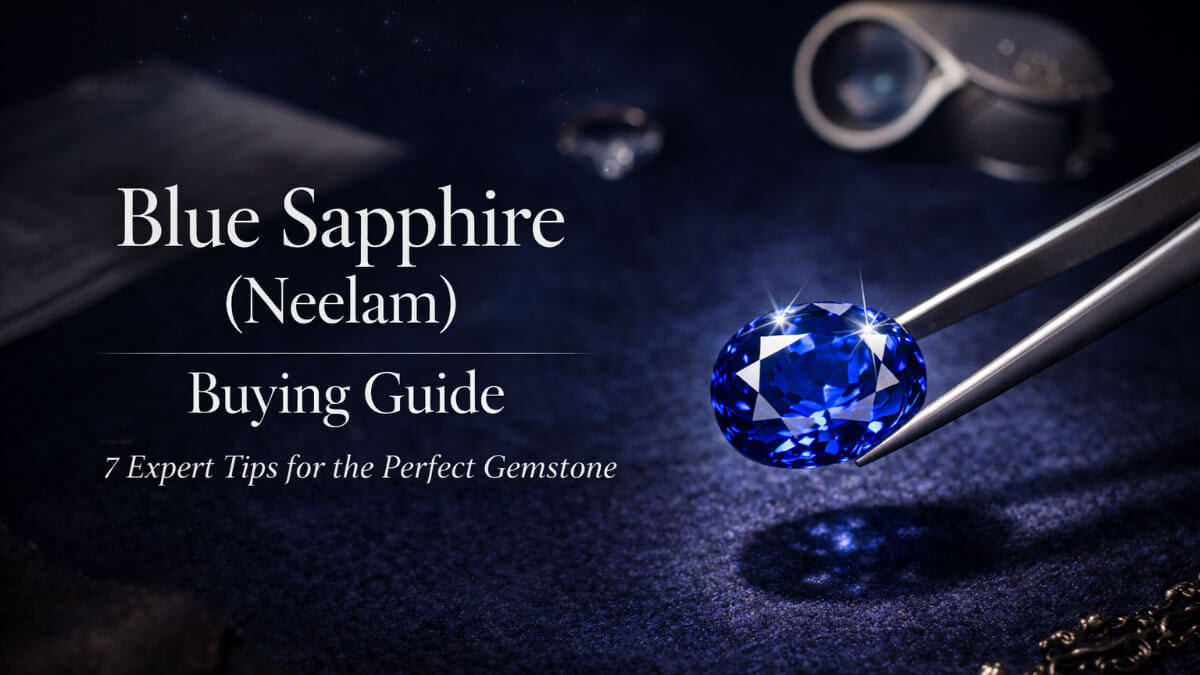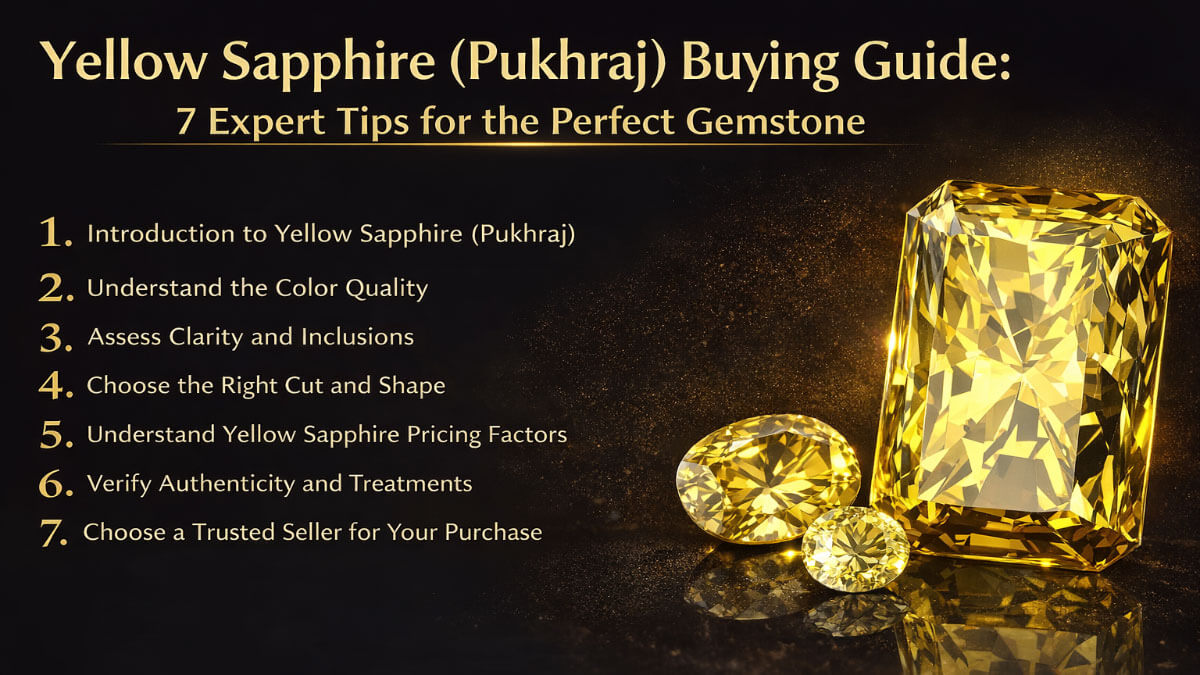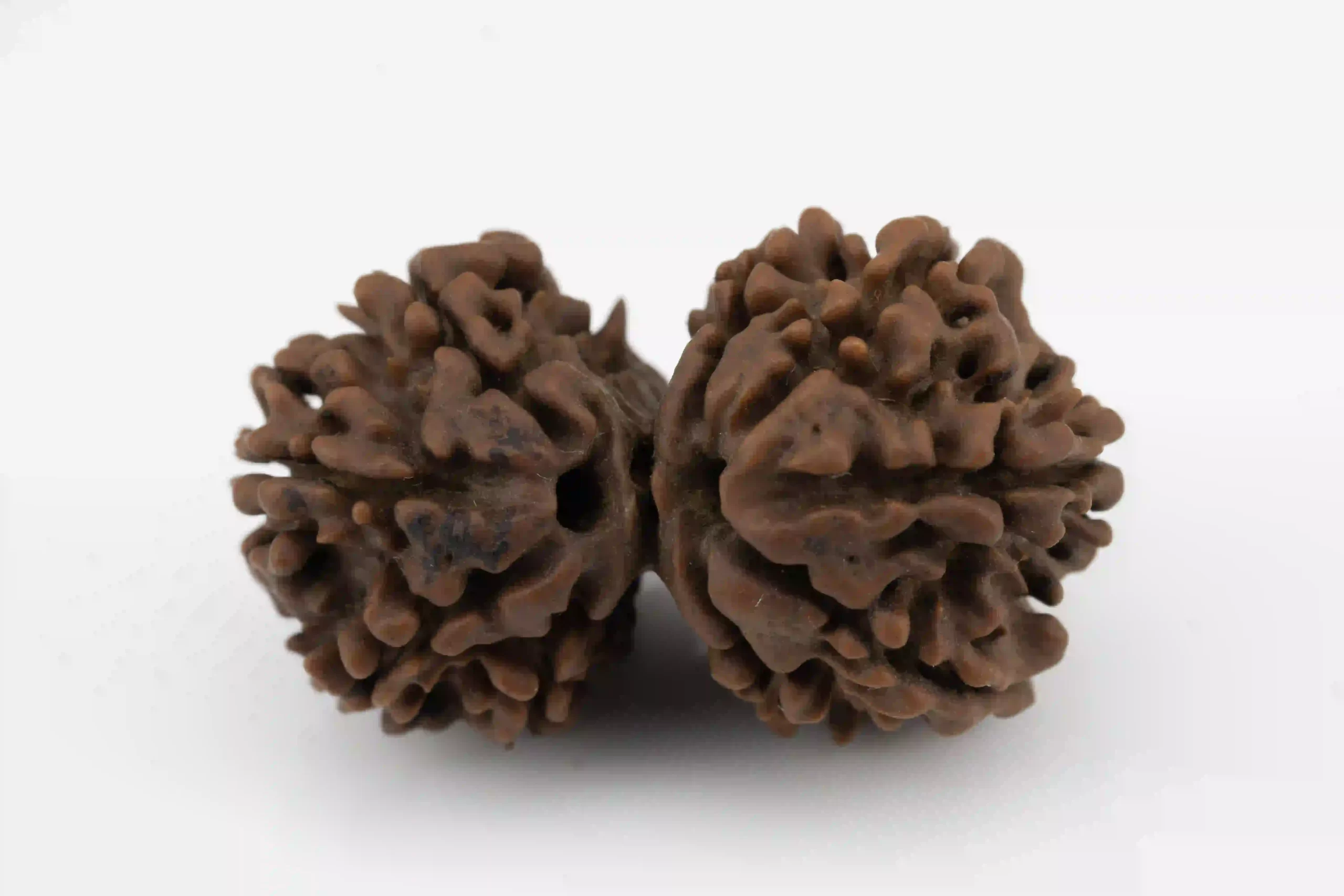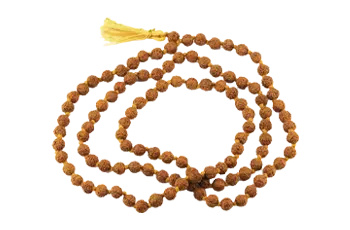Your Ultimate Gemstone Buying Guide for India (2025 Update)
Welcome to the most comprehensive gemstone buying guide India has to offer for 2024. Embarking on the journey of buying a gemstone is an exciting experience. Whether for its dazzling beauty, astrological power, or as a timeless investment, a gemstone is a treasure. This guide is designed to empower you with the expert knowledge needed to navigate your purchase with confidence.
What You’ll Learn in This Guide
This guide provides a complete roadmap for your gemstone purchase, covering:
- Mastering the fundamentals of gemstone quality beyond the basic 4 Cs.
- The profound role of gemstones in Vedic astrology, including the Navratna and their substitutes (Upratnas).
- A practical toolkit for navigating your purchase, from certification to identifying treatments.
- Insider tips for safely buying gems in India’s famous markets and avoiding common scams.
- Essential post-purchase care to protect your investment for generations.
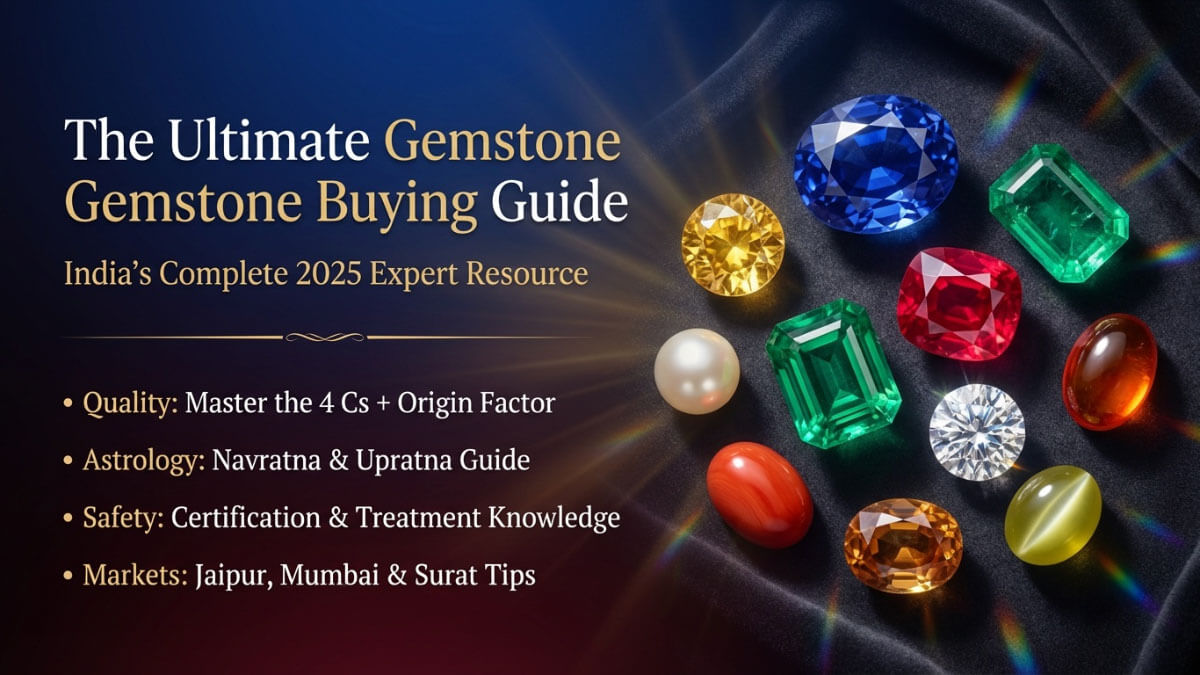

Mastering Gemstone Quality: The Foundation of Our Guide
The quality and value of a gemstone are determined by a set of globally recognized criteria. While the “4 Cs” provide a foundational framework, a true expert evaluates these factors with a deeper layer of nuance, a key focus of our gemstone buying guide for India.
Color: The Supreme Value Factor
For most colored gemstones, color is the single most important determinant of value. An exceptional color can make a stone with moderate clarity more valuable than a near-flawless stone with a less desirable color. Color is evaluated based on three components:
- Hue: This is the stone’s pure spectral color—the primary red, blue, green, or yellow.
- Tone: This describes the lightness or darkness of the hue. The most desirable stones typically fall in a medium tone range.
- Saturation: This refers to the color’s intensity or purity. Highly saturated gems display a rich, vivid color.
Clarity: A Gem’s Inner World
Clarity refers to the absence of internal features called inclusions. Unlike diamonds, flawless colored gemstones are exceedingly rare. The Gemological Institute of America (GIA) classifies colored gemstones into three clarity categories:
- Type I: Gems (like Aquamarine) that are often “eye-clean.”
- Type II: Gems (like Sapphire and Ruby) that typically have some inclusions.
- Type III: Gems (like Emerald) that almost always have noticeable inclusions, often called jardin.
Cut: Unleashing Brilliance and Life
The cut is the human contribution that unlocks a gem’s beauty. A superior cut maximizes brilliance and scintillation (sparkle). A poorly proportioned cut can lead to windowing (a lifeless center) or extinction (dark patches).
Carat Weight: More Than Just Size
Carat is the standard unit of weight for gemstones (1 carat = 200 milligrams). The price per carat increases exponentially with size because large, high-quality rough crystals are significantly rarer.
The Fifth ‘C’: Country of Origin
For many precious gemstones, geographic origin is a critical factor that can dramatically influence value. Certain locations have historically produced gems of such exceptional quality that their name alone carries a premium. Any good gemstone buying guide for India must highlight this.
- Burmese Rubies: Known for their intense, fiery “pigeon’s blood” red.
- Colombian Emeralds: Famed for their deep, vibrant green hue.
- Kashmiri Sapphires: Revered for their rich, velvety, cornflower blue color.
Vedic Astrology in Our Gemstone Buying Guide for India
In India, a significant portion of the gemstone market is driven by Vedic astrology. The most powerful of these are the Navratna, or nine primary gems, each believed to harness planetary energies.
The Nine Planetary Gems (Navratna)
| Gemstone (Indian Name) | Planet | Primary Benefit |
|---|---|---|
| Ruby (Manik) | Sun | Authority, Leadership, Vitality |
| Pearl (Moti) | Moon | Emotional Balance, Peace, Calm |
| Red Coral (Moonga) | Mars | Courage, Energy, Ambition |
| Emerald (Panna) | Mercury | Intellect, Communication, Business |
| Yellow Sapphire (Pukhraj) | Jupiter | Wisdom, Prosperity, Fortune |
| Diamond (Heera) | Venus | Love, Luxury, Creativity |
| Blue Sapphire (Neelam) | Saturn | Discipline, Fortune, Perseverance |
| Hessonite (Gomed) | Rahu | Clarity, Protection from Negativity |
| Cat’s Eye (Lehsunia) | Ketu | Spiritual Insight, Protection |
Crucial Astrological Advice: It is highly recommended to consult a learned astrologer before wearing an astrological gemstone. An improperly chosen stone can have adverse effects.
The Science of Wearing Astrological Gems
To receive full astrological benefits, a gemstone must be worn according to specific Vedic procedures, including an energization ritual known as Prana Pratishtha to purify and activate the gem’s power.
Upratnas: Potent and Accessible Astrological Alternatives
The primary Navaratna Gemstones can be very expensive. Vedic texts prescribe Upratnas, or superior substitute gemstones, which are astrologically approved alternatives that provide an accessible entry point into gem therapy.
The Savvy Buyer’s Toolkit for India
Armed with knowledge, the final step is to understand the mechanics of a safe purchase. This toolkit provides the practical knowledge needed to protect your investment when buying gemstones in India.
Your Essential Checklist: Questions to Ask
- Is this gemstone natural or lab-created?
- Has it undergone any treatments? If so, are they permanent?
- What is the exact carat and ratti weight?
- Can you show me the stone under different lighting?
- Does it come with a certificate from a reputable lab like GIA?
- What is your return or exchange policy?
Certification: Your Non-Negotiable Proof of Authenticity
A certificate from an independent, reputable gemological laboratory is your single most important document. It is a scientific verification of the gem’s identity, characteristics, origin, and any detected treatments. This is different from an appraisal, which assigns a monetary value.
Treatments and Enhancements: What Every Buyer Must Know
Many gemstones undergo treatments to improve their appearance. This is an accepted practice, but it must always be disclosed as it affects value. Distinguish between stable treatments (like heating sapphires) and unstable ones (like glass-filling in rubies).
Navigating the Indian Market: A Buyer’s Guide
India’s gemstone trade is a vibrant, centuries-old industry. Knowing where to go and what to watch out for is key to a successful purchase.
India’s Gemstone Capitals
- Jaipur: The global capital for cutting and trading colored gemstones.
- Mumbai: A major trading hub for both diamonds and colored stones.
- Surat: The world’s largest diamond processing center.
Buyer Beware: Recognizing and Avoiding Common Scams
While most dealers are honest, be aware of the prevalent “tax-free shipping” scam targeting tourists. A friendly stranger offers a “risk-free” opportunity to help them ship gems abroad to avoid taxes, promising you a commission. This often leads to a situation involving a fake “customs official” demanding a large payment to avoid arrest.
How to Stay Safe:
- Be suspicious of any unsolicited business propositions from strangers.
- Never agree to ship items for someone else to “avoid tax.”
- Deal only with established, reputable jewelers with a physical store.
- Always insist on a proper invoice and a certificate from an independent lab.
Post-Purchase Care: Protecting Your Investment
A fine gemstone can last for generations with proper care.
The Principles of Gemstone Care
- Last On, First Off: Put jewelry on after applying makeup and perfume.
- Avoid Rough Wear: Remove jewelry before sports, gardening, or cleaning.
- Proper Storage: Store each piece separately in a soft pouch to prevent scratches.
Why Trust Ratna Gems™ for Your Gemstones?
At Ratna Gems™, we are committed to providing authentic, high-quality astrological and jewelry gemstones with complete transparency. We are your trusted source because we offer:
- Certified Authentic Gemstones: Every gemstone is certified by a recognized lab like the International Gemological Institute (IGI).
- Transparent and Honest Pricing: We offer competitive prices with full disclosure on quality, origin, and treatments.
- Unmatched Customer Support: Our experts are here to guide you, and our 7-day return policy ensures your complete satisfaction.
Frequently Asked Questions
What is the difference between a precious and semi-precious gemstone?
This is a traditional distinction. “Precious” historically referred to diamond, ruby, sapphire, and emerald. However, a high-quality semi-precious stone can be much more valuable than a low-quality precious stone.
What is the difference between a gemstone certificate and a jeweler’s appraisal?
A certificate from a lab (like GIA) identifies and grades the gemstone’s characteristics. An appraisal is done by a jeweler to determine the monetary value, usually for insurance purposes.
What is the difference between carat and ratti?
A carat is the international standard unit of weight (1 carat = 200mg). A ratti is a traditional Indian unit of weight (1 ratti ≈ 182mg). For astrological purposes, ratti is often used.
Are treated gemstones bad?
Not necessarily. Many treatments, like the standard heating of sapphires, are permanent and widely accepted. The most important thing is that all treatments are fully disclosed by the seller, as they affect the value.

